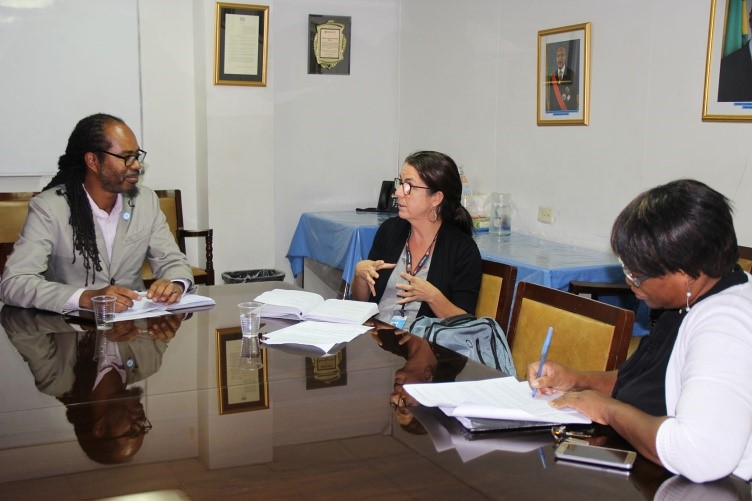
NFPB and UNFPA Sub-Regional Office Collaborate on Plans to Engage Parliamentarians in Sexual and Reproductive Health IssuesDiscussions encompassed engaging Parliamentarians in Jamaica on advancing Sustainable Development Goals (SDGs)
Image: The Sexual and Reproductive Health Technical Advisor of the United Nations Population Fund Sub-Regional Office for the Caribbean, Dr. Pilar de la Corte Molina (centre) met with the National Family Planning Board’s Enabling Environment and Human Rights (EEHR) Unit, represented by Director, Devon Gabourel (left) and Technical Officer, Genice Wright (right) at the NFPB’s Headquarters in Kingston.
KINGSTON, JAMAICA – Devon Gabourel of the National Family Planning Board (NFPB) and Dr. Pilar de la Corte Molina, of the United Nations Population Fund Sub-Regional Office for the Caribbean (UNFPA) met earlier this month to explore how the agencies could collaborate to engage Parliamentarians in Jamaica on their role to advance Sustainable Development Goals (SDGs), particularly in regards to Sexual and Reproductive Health and Rights (SRHR). They also discussed other strategies that could be pursued to bridge legislative and policy gaps that challenge overall sexual and reproductive health outcomes for the population. Dr. Molina will present her recommendations to the NFPB’s multidisciplinary Legislation and Policy Review Committee later this month.
WHAT IS PANCAP?
PANCAP is a Caribbean regional partnership of governments, regional civil society organisations, regional institutions and organisations, bilateral and multilateral agencies and contributing donor partners established on 14 February 2001. PANCAP provides a structured and unified approach to the Caribbean’s response to the HIV epidemic, and coordinates the response through the Caribbean Regional Strategic Framework on HIV and AIDS to maximise efficient use of resources and increase impact, mobilise resources and build the capacity of partners.
What are the Global AIDS Strategy 2021–2026 targets and commitments?
If targets and commitments in the strategy are achieved:
- The number of people who newly acquire HIV will decrease from 1.7 million in 2019 to less than 370 000 by 2025
- The number of people dying from AIDS-related illnesses will decrease from 690 000 in 2019 to less than 250 000 in 2025.
- The goal of eliminating new HIV infections among children will see the number of new HIV infections drop from 150,000 in 2019 to less than 22,000 in 2025.
What are the 95-95-95 Targets for ending AIDS?
- 95% of People Living with HIV know their HIV status;
- 95% of people who know their status on treatment; and
- 95% of people on treatment with suppressed viral loads.
HELPFUL LINKS:
Global AIDS Strategy 2021–2026, End Inequalities, End AIDS
https://pancap.org/pancap-documents/global-aids-strategy-2021-2026-end-inequalities-end-aids/
Caribbean Regional Strategic Framework on HIV and AIDS (CRSF) 2019-2025
https://pancap.org/pancap-documents/caribbean-regional-strategic-framework-2019-2025/
